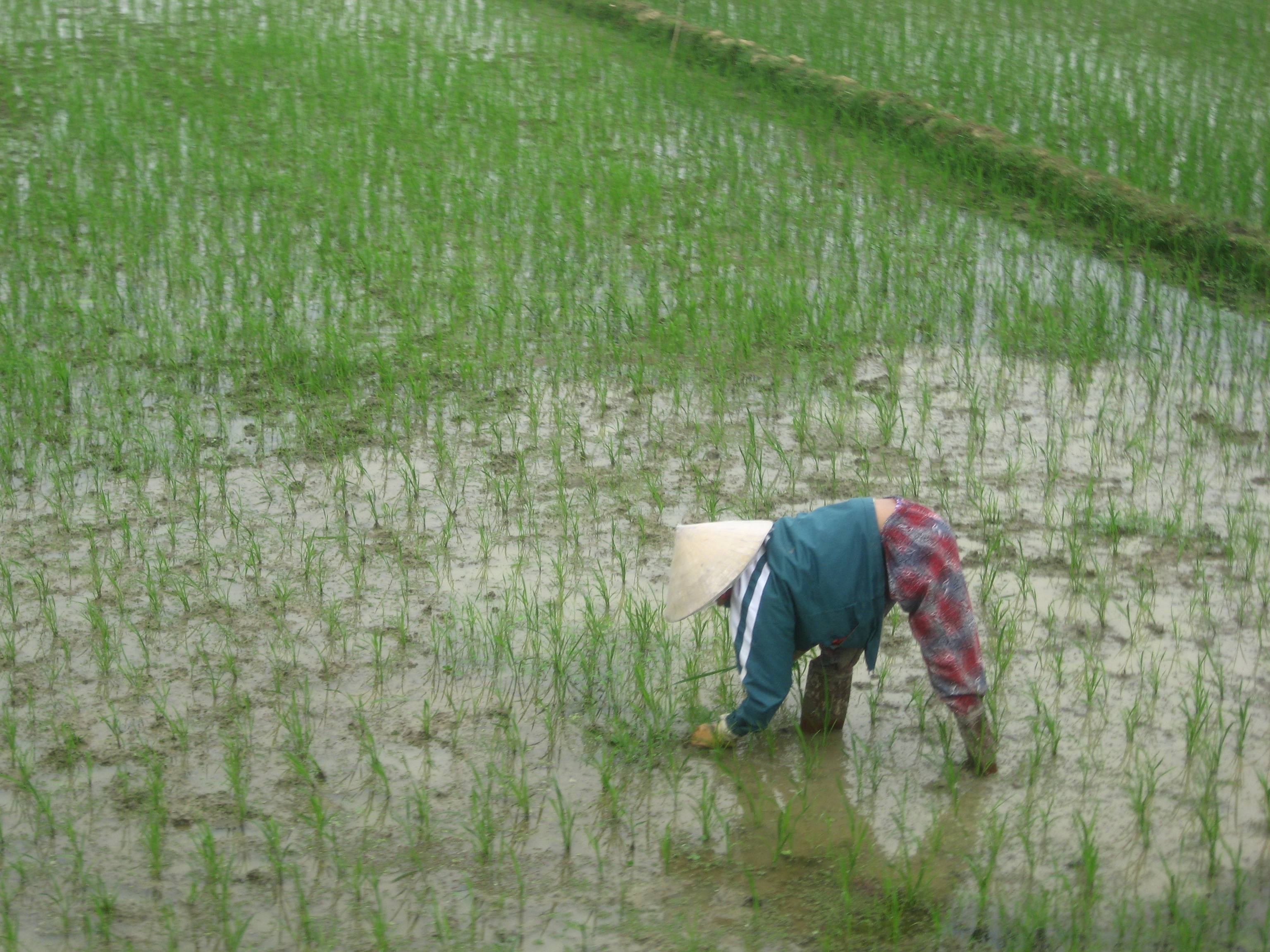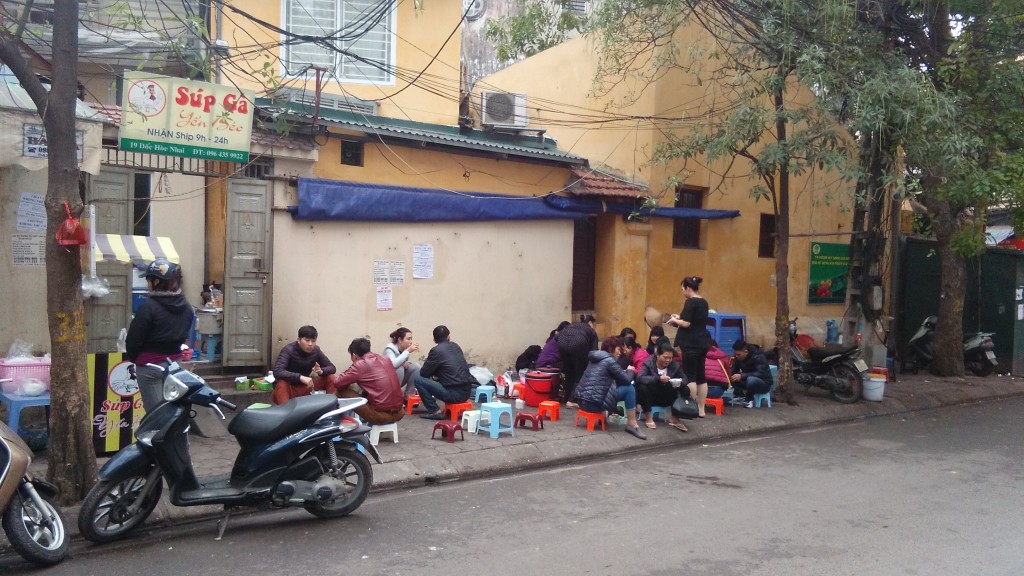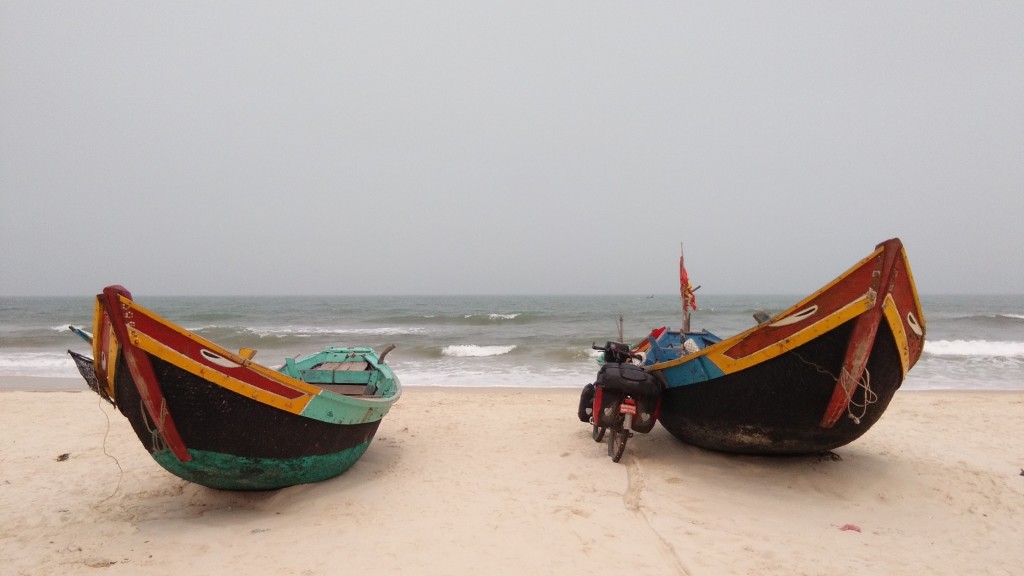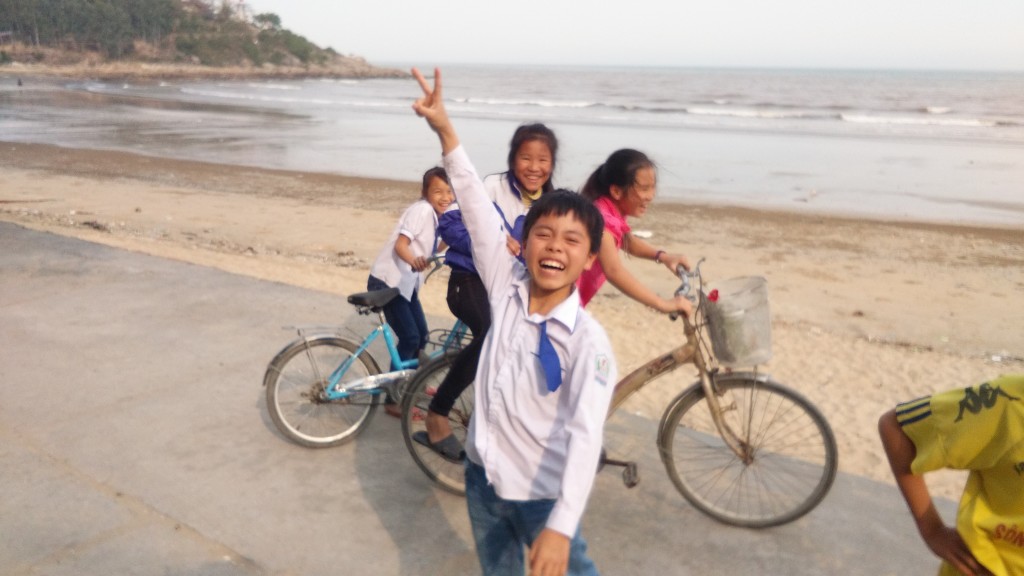It goes a-one, two, three
Let’s be honest, what most people associate with Vietnam is war. Not only because it was a big political issue in the western world, but also because there are endless movies about it. Additionally in more or less every second nineties Hollywood movie there is at least one character who has been to ‚Nam and tells his story, even if the movie is not about the war.
We enter Vietnam in the north west by bus, because Cora still feels bad and wants to go to the hospital in Dien Bien Phu. Dien Bien Phu is no particular interesting city, but hundreds of steps up to a memorial catch our attention. It is the memorial of the battle of Dien Bien Phu in 1954, in which several thousand Vietnamese died in a war for independence. Because after the Second World War and after Japan had left Vietnam, France had decided to take over Vietnam once again. But they were defeated here in Dien Bien Phu. It was the end of French Indochina and decades of colonization. Vietnam had a year of peace before the Vietnam war followed.
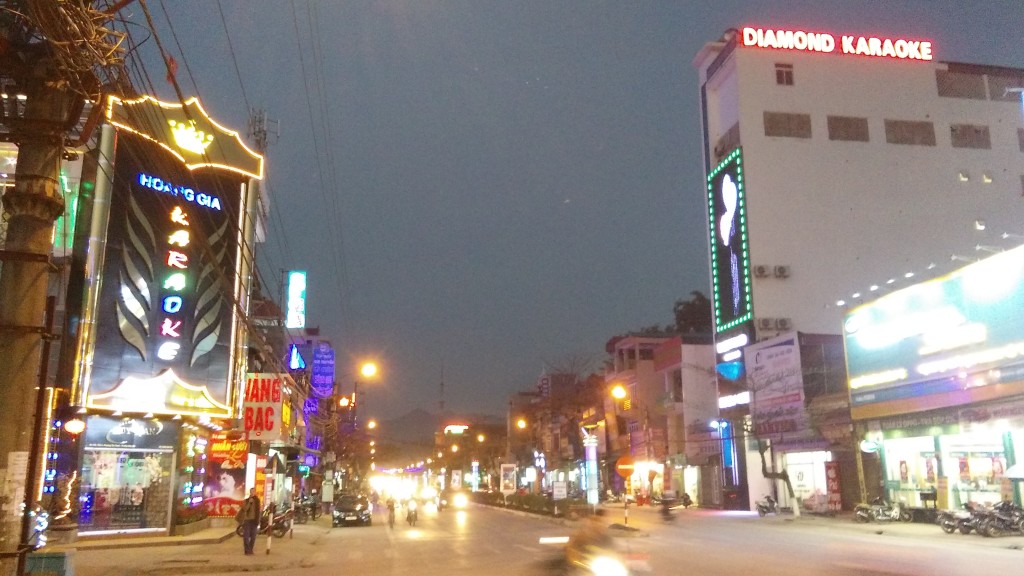
We stay three nights in Dien Bien Phu, because Cora’s condition is not getting better but the „hospital“ in Dien Bien Phu is of little help. So we have time to walk around a bit. The small market right around the corner of our guesthouse is a nice little walk.
The fruits of paradise
I didn’t write much about the fruit situation in South East Asia so far. I need to change this, because for me it is one reason to call the region down here paradise. In India we already had a lot of bananas and oranges, in Assam and Manipur we additionally were able to buy pineapples and sometimes coconuts at little stalls on the street. But since Myanmar it is just incredible.
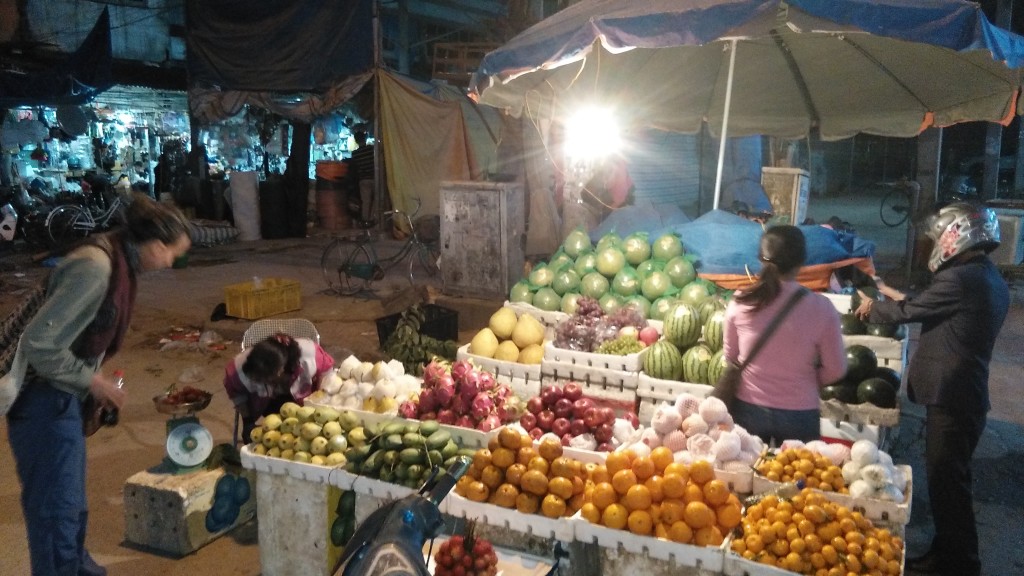
There are yellow mangos, green mangos, oranges, apples, Chinese pears, cheekoos, pomelos, Malay apples, watermelons, grapes, lychees, pitahayas (dragon fruit), bananas, coconuts, rambutans, longans, mangosteens, durians, papayas, guavas, tamarinds and sugar cane. And that’s only what is currently ripe.
I’m a big fan of lychees, but I didn’t know that lychee had two little brothers: longan and rambutan.
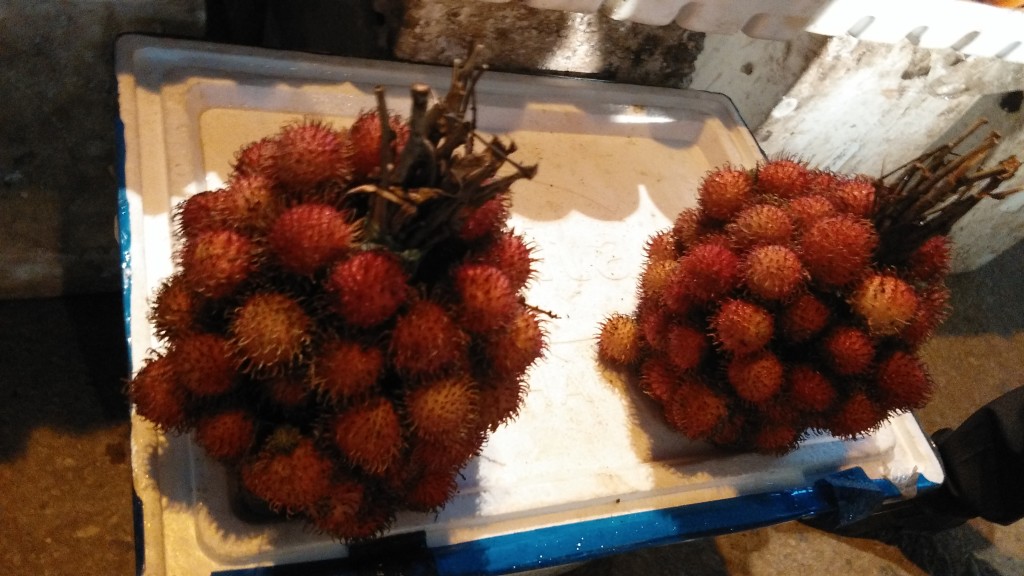
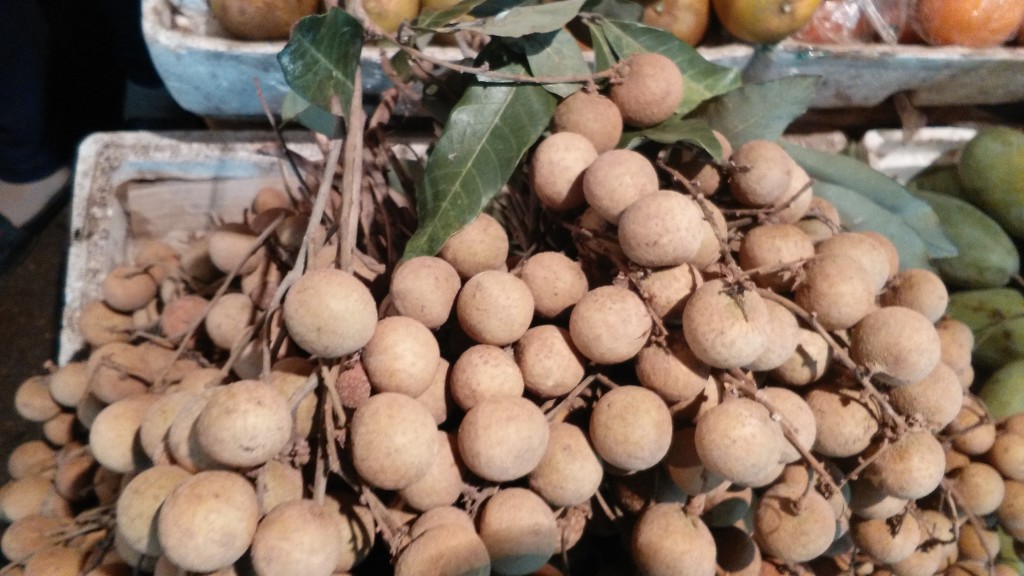
Rambutan is listening to Rage Against the Machine and Nirvana and has a weird hair cut. Longan has the hair cut of a Buddhist monk and is the more reasonable guy. Lychee of course takes the lead, because it is most easily peeled. However, rambutan and longan are worth a try, too, because they have a slightly different taste.
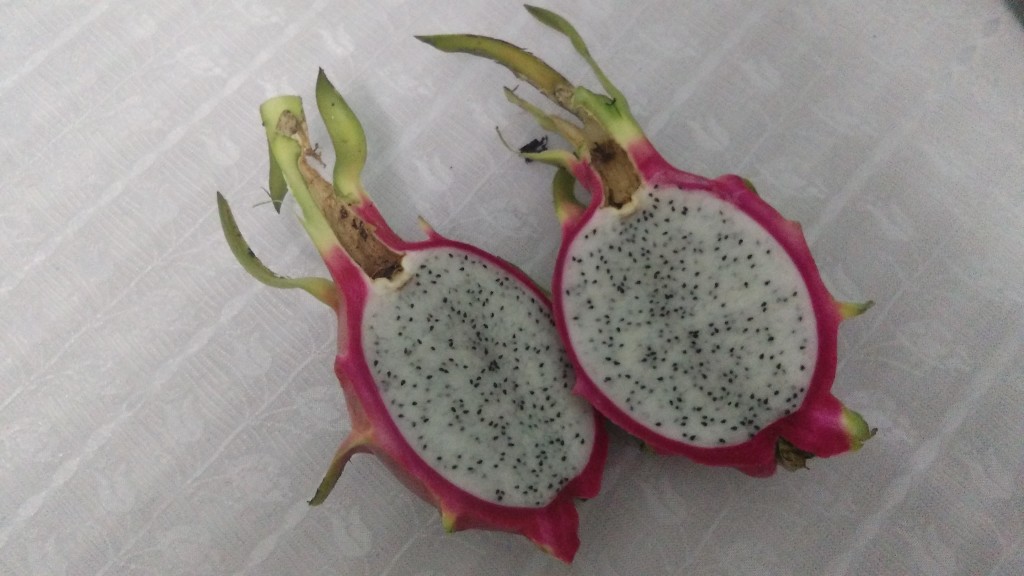
Pitahaya is the kid with the raddest parents, because they are actually cacti. I mean how cool is that? So pitahaya didn’t know how to be even cooler than its parents. Dying its outside pink and having some thick dreads isn’t really shocking when your parents have their bodies covered with thorns. So pitahaya did what every kid in this situation would do: It focused on its inner values. The parents were only water and some tissue inside and green like outside. Pitahaya shocks when opened. It is black and white. It likes the extremes. There are no shades of gray. The consumer doesn’t know what taste to expect, since there are not many white fruits. Does it taste like a lychee? Or a Coconut? Or even like radish? Bam! Pitahaya strikes again and decided to taste like kiwi. Pitahaya did a very good job in superseding its parents. If earth’s god had to compete in a galactic fruit design award, pitahaya would probably be the candidate.
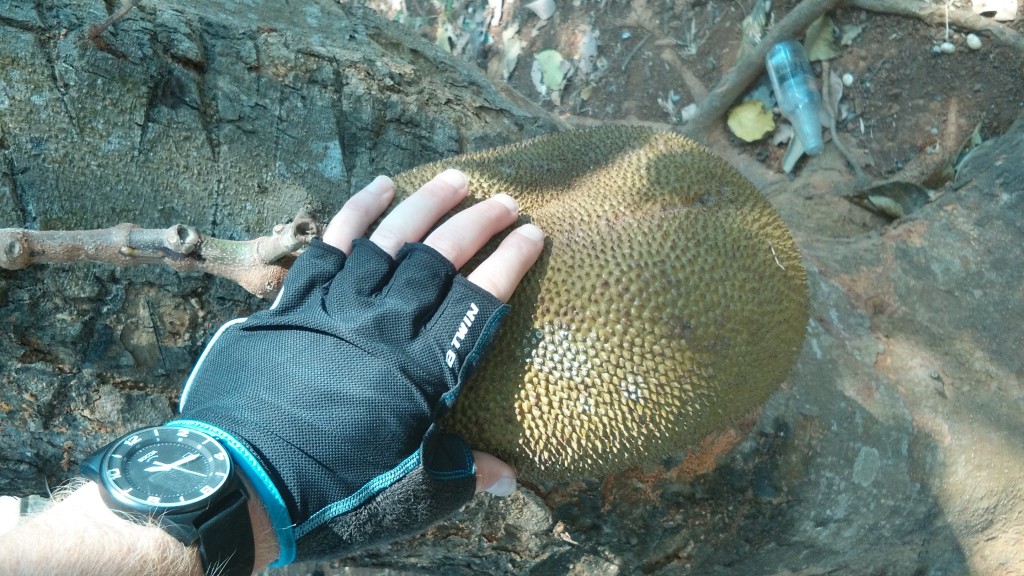
Durian, tamarind, papaya, mangoes, bananas and coconut are growing more or less everywhere. However, we usually can’t eat them, because the ripe fruits are usually taken. We had some tamarind from a tree, though. Once we heard a coconut fall from a palm tree. Seconds later a door opened and someone came out to pick it up. Anyway, fruits are cheap. Especially coconuts, which are often only opened to drink the milk. The rest is thrown away.
Cora understandably wants to go to a real hospital. We are in a high risk malaria region and so we decide to take a bus to Hanoi. It is a sleeping bus, which means that 6 people can sleep on 5 beds if they do not exceed 160 cm body height. The Vietnamese try to fool us with the price for the bus. They want extra money for the bicycles and also for the dinner on the road. We repeat: „no this is all included in the price“ until they accept.
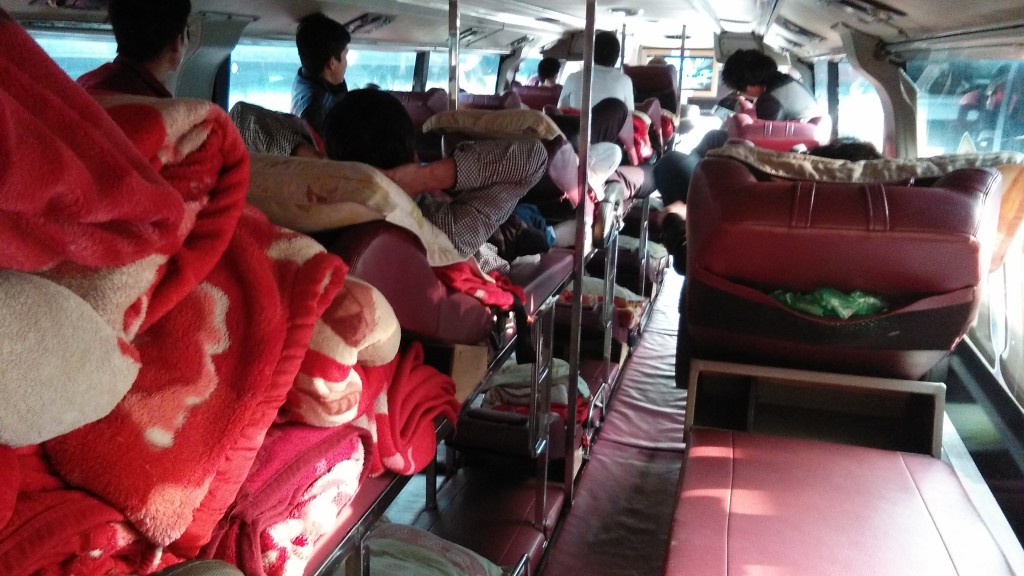
We arrive in Hanoi in the early morning. Hanoi is the second largest city in Vietnam and of course its capital. Like always I read the Wikipedia article about the city. One thing sticks to my mind: On Christmas Eve 1972 alone the US dropped 40.000 tons of explosives on Hanoi. That’s three times the power of the Hiroshima bomb. Yeah, liberation!
Today Hanoi is rather touristic with a lot of little cafes and bars, but also small street kitchens, where we usually get our daily dosage of „Pho“ a noodle soup with thin slices of beef.
It still feels authentic with usually more locals than tourists as long as you stay away from the most touristic places. We actually like it a lot. After such a long time another city with a real identity and a lot to offer. The war has left its visible traces today only in cafes called „VietCong“ with a military atmosphere and in bars with american cowboys in front. Also the French colonial time left its traces. Hanoi is not a very beautiful city, probably because it has been destroyed more or less completely during the wars. But it has (kept?) an identity and is full of life and modern. People focus on what’s ahead. We stay at a Vietnamese warmshower host who grew up in France, but returned to Hanoi after the war to help develop a bright future.
Cora finally gets her blood tested at the French hospital. No Malaria, no Dengue. The next day we leave Hanoi.
We cycle towards the mountains of Ninh Binh. After a while we leave the highway to get closer to the people and the villages.
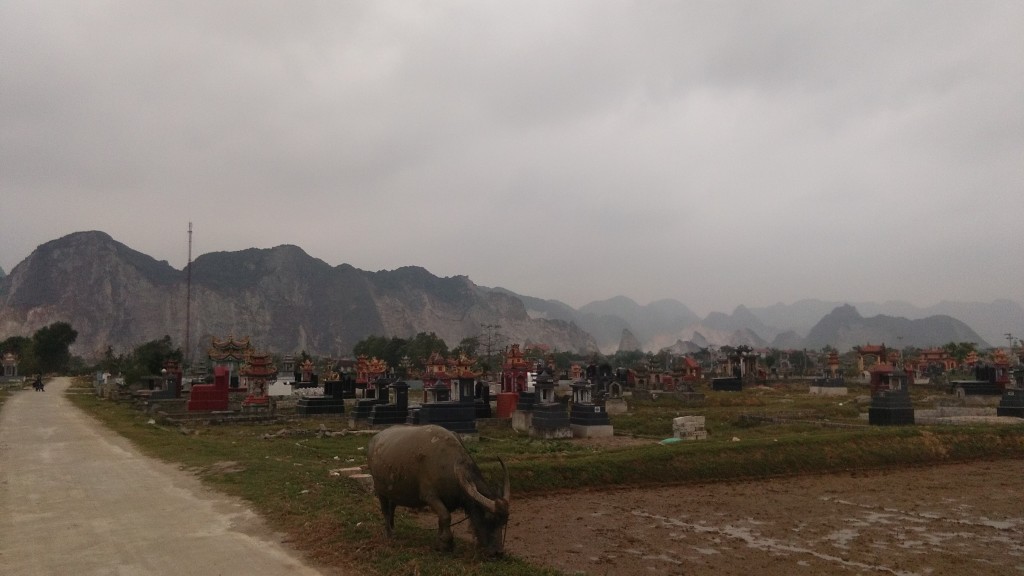
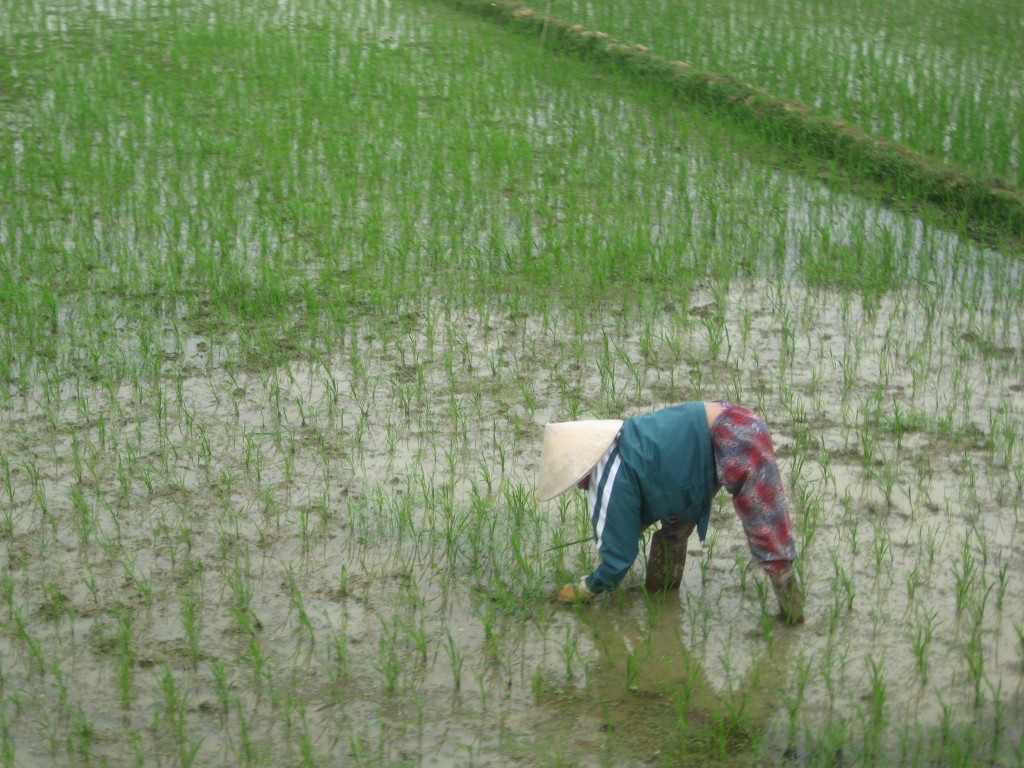
The next day we continue south. We want to have lunch at a small restaurant. The waitress doesn’t speak English, but a friendly woman from a big group at another table helps. We ask what they offer today.
She: „We have dog meat and….“
Me (thinking): „Oh, alright, I take the second option then.“
She: „….and cat meat“
I always liked cats and dogs, just not for lunch. Anyway, they are already dead now and it doesn’t taste bad. The woman invites us to eat at their table.
The situation is awkward, they are all more or less drunk and ask a lot of questions. The guy next to me lays his chin on my shoulder while holding my hand, because he didn’t let go after shaking hands. He starts to drool. No matter where I look, some drunk guy is smiling back at me. It is one of these situations, where you try to smile, but you are afraid they notice you actually don’t enjoy them as much as they enjoy you. Of course I get constantly asked how the cat is and they put more and more on my plate. „Yeah, great! Thanks a lot!“ I repeat again and again. In these cases Cora always becomes temporary vegan. But I am hungry, so what can I say. Then the English speaking woman next to Cora asks if we are eating here, because today was International Women’s Day. Oh, we didn’t know that. Actually since we left Europe I have no idea what day of the week it is. She is confused. She then explains to Cora how important this day is in Vietnam. So Cora has her own challenge of pretending that it is great what they do today. International Women’s Day in Vietnam, however, in this case goes like this: The whole office staff gets invited to a cheap restaurant, where they eat cheap cats and dogs. Then the men all get wasted. The guy drooling on my shoulder is the chief of the government office they are working for. The women stay sober, so they can carry everybody to the Karaoke club. Suddenly I feel more comfortable, because this whole situation is so silly. This feminist woman trying to explain the importance of this day surrounded by comatose superiors drooling in happiness like little babies. I start to laugh uncontrollably but everybody is convinced I really enjoy the time together with them. In a way I do. A lot of guys want to shake my hand now and offer alcoholic drinks. I decide to be an ad hoc nondrinker like Cora decided to be ad hoc vegan. The chief asks if Cora is my wife. Since she is not, he also wants to touch her. Drinking Johnnie Walker somehow doesn’t save you from behaving like a Jägermeister. We get invited to Karaoke but decline, what we regret afterwards. There will probably be no other chance to do Karaoke with the locals.
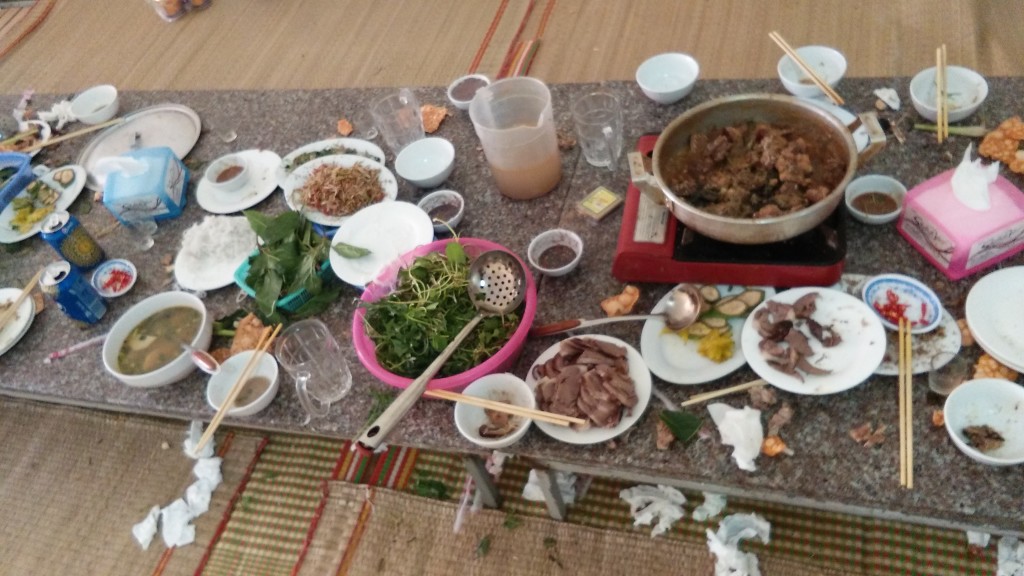
We continue and after 363 days and 21263 km we finally reach the Pacific Ocean in Sam Son. The weather is cloudy and it is rather cool at around 18°C. That’s perfect for cycling, but not for beach holidays.
Anyway, we made it. We crossed Europe and the Asian continent and have reached the end of the world – for now. It’s amazing. Even the first dude since India shows up and tells us that it is forbidden to take the bicycles to the beach. Too late.
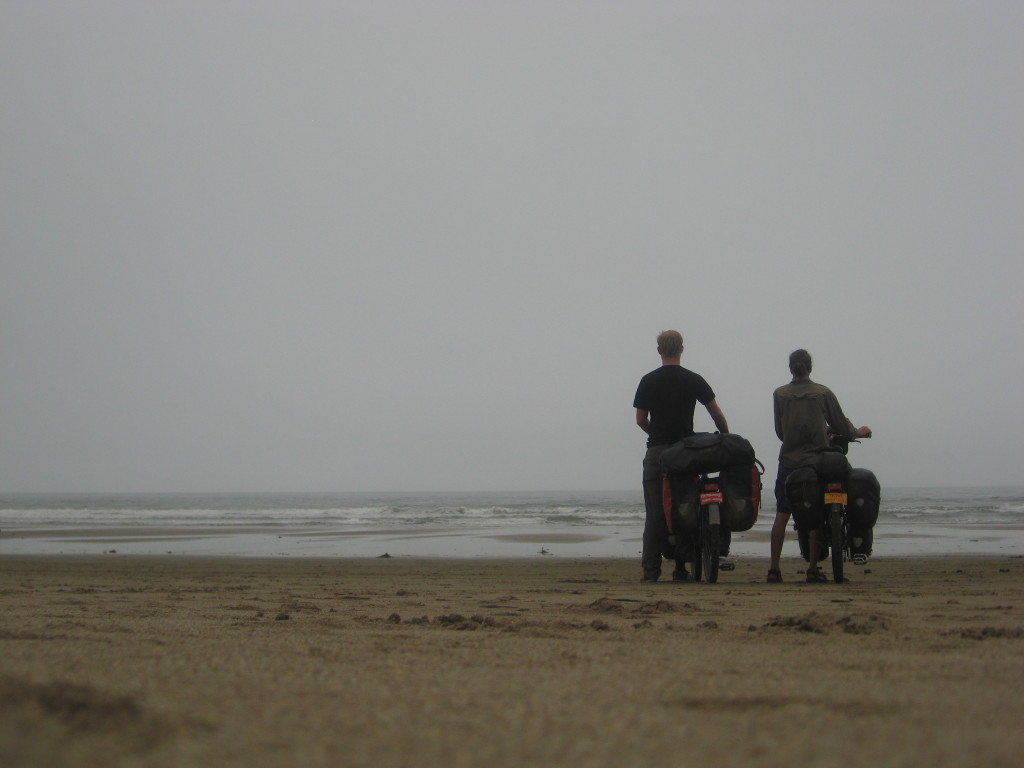
We continue down south along the coast and find long beached, where we are all alone. No palm trees, but white sand.
There are not many hotels at the beach, but it seems like plans exist to change that quickly. In some places wide roads with street lights have been paved. The hotels will come soon.
People here aren’t nice. We get yelled at like dogs. „Come here!“ and some shout „hello!“ but without expecting any response. It is hard to describe, but we don’t feel welcomed at all, even though there shouldn’t be much tourists around usually. We meet another cyclist from France who got the same impression and even was convinced the mood was close to getting violent.
The coffee in Vietnam is exceptional. We also like the Banh Bao, steamed buns filled with meat or egg. Even though Pho is not our favorite food, it contains a lot of minerals and water so we also eat it a lot.
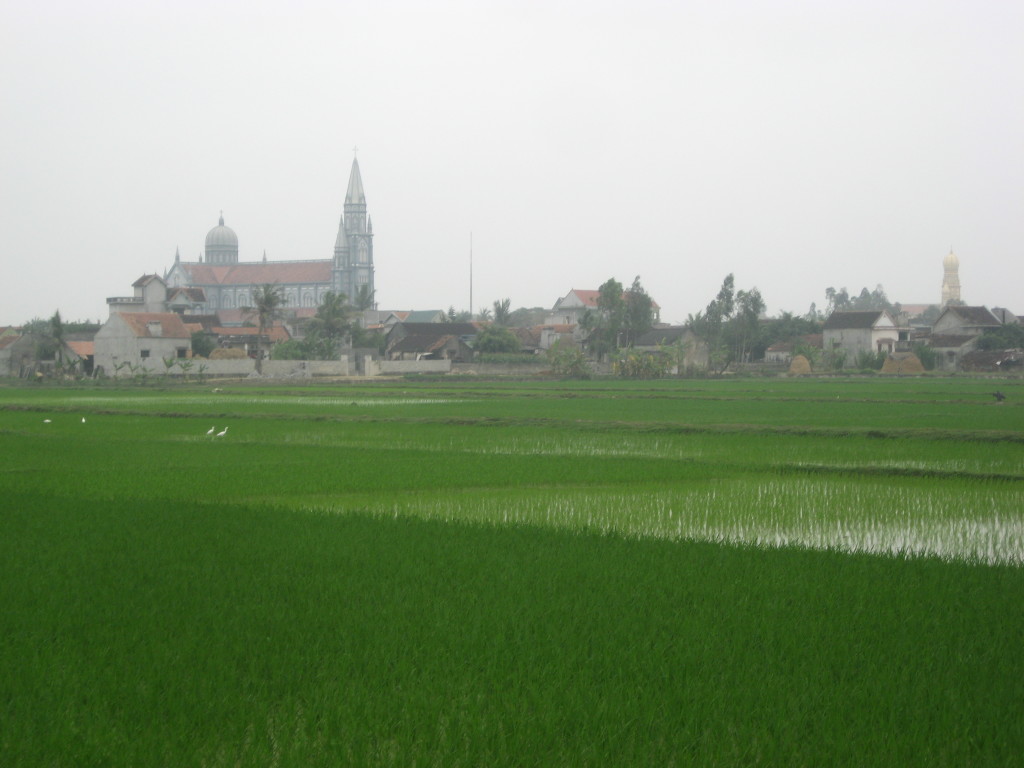
Only around 7% of Vietnamese are Christians, but we see a lot of big, beautiful churches sometimes two of them in one town. We also often pass churches that are under construction. It seems like the Protestants try to get their part of the market share in a country in which more than 80% don’t believe in god. Yet. In other countries network providers and hardware manufacturers build modern „temples“, here the church found a market worth conquering. While on one hand asking for more rights as a minority, the Protestants on the other hand are the fastest growing religion in Vietnam, expanding at a rate of 600% in the previous decade according to the US department of state. Bombs didn’t help, so let’s just invade with crosses.
Via Dong Hoi we arrive in Dong Ha and decide to rent a scooter to Hue, which is a 160 km detour from our route.
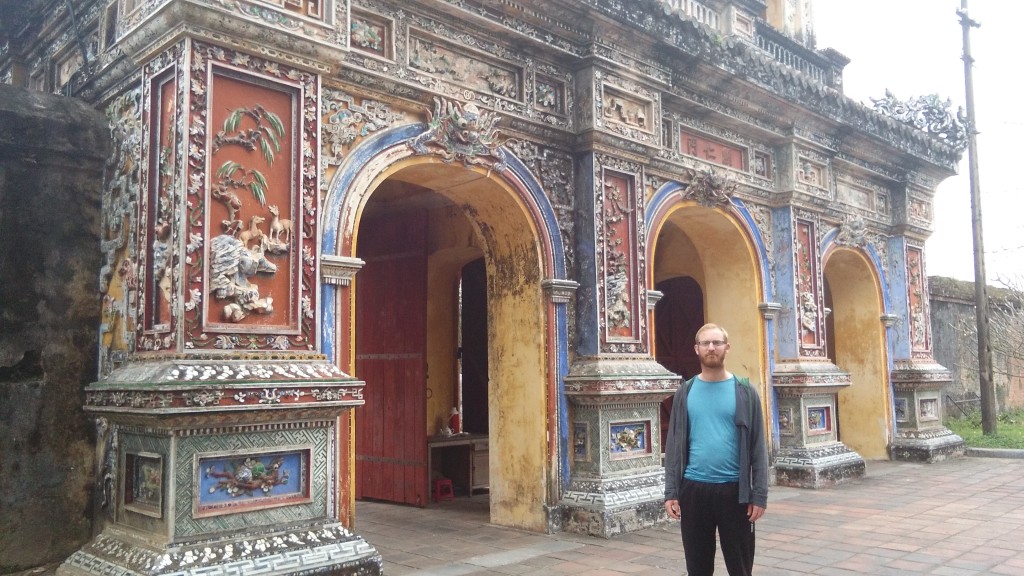
We have our anniversary lunch at a restaurant in a colonial villa. Overly polite staff is serving us. Most guests soon adapt and show a colonialists attitude. On the walls are hanging pictures of half naked tribal women and hard working slaves. It feels like being served by a deer in a hunter’s pub with the head of the deer’s ancestor hanging on the wall. The colonial travel tours are usually booked by French, the battle field tour – I call it the bomb track – usually by US citizens. We like the food a lot, but soon leave.
Back in Dong Ha we leave the Pacific Ocean and head towards Lao Bao at the border to Laos. It soon gets very hot and we realize how lucky we have been all the past days with cloudy weather and even rain. Now South East Asia shows its real face again.
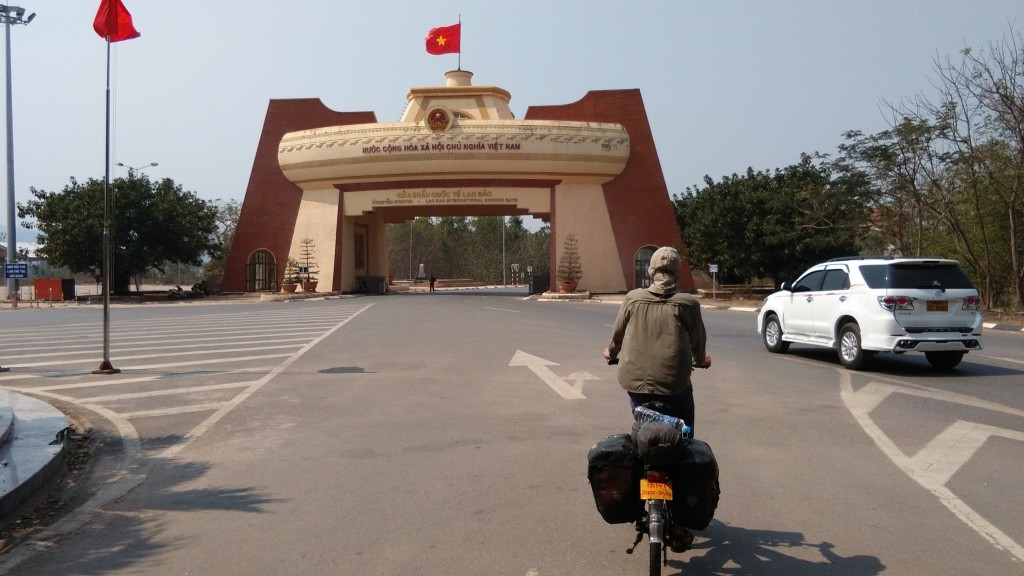
After the Black Sea, we had finally reached another Ocean in Vietnam. We had bad weather, but that didn’t make our time in Vietnam less exciting. The people of Hanoi were modern and open. Close to the Pacific we felt quite some hostility. I guess war has shattered many young men’s dreams, made them disabled, bitter and mean. Vietnam doesn’t seem to be at peace for me. The French and US influence is still very well visible. French restaurants are reminding them on the colonial times. US citizens living in Vietnam quickly tell you heroic stories of how they dropped Agent Orange some decades ago. Strange how the same people is one of the most easily offended in the world. And in between all that someone builds a church. The western world seems like a virus in a Vietnamese body that fought horrible wars to get rid of it. This little country defeated the French colonists right after the Japanese occupation had ended and it even defeated the US world power. Of course they paid a high price for that. However, they survived being the battlefield of a war we all too easily call „cold“.
Good-Bye Vietnam! Thanks for surviving.
War has shattered many young men’s dreams
Made them disabled, bitter and mean
Life is too precious to be fighting wars each day
War can’t give life it can only take it awayWar
What is it good for? Absolutely nothing
Say it again, war
What is it good for? Absolutely nothing
